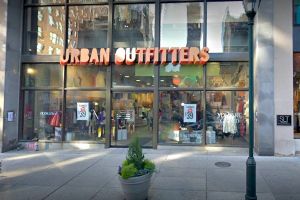Urban Outfitters
Urban Outfitters, Inc. (URBN) is a multinational lifestyle retail corporation headquartered in Philadelphia, Pennsylvania.[1]
Founded in 1970 in a small space across the street from the University of Pennsylvania, Urban Outfitters now operates over 200 stores in the United States, Canada and Europe, offering experiential retail environments and a well-curated mix of on-trend women’s and men’s clothes. Urban Outfitters also carries everything you need to decorate your small space, apartment or dorm, with a UO Home collection that includes bedding, tapestries, rugs, shower curtains and furniture.[2]
Racial Profiling
July 2020, URBN, which owns retail chains Urban Outfitters and Anthropologie, has faced allegations of racial profiling by using code words such as "Nick," "Nicky" or "Nicole” for potential shoplifters. Urban Outfitters posted a response on its website stating that it would conduct a third-party review of store practices, recruit a more diverse workforce and have mandatory diversity training at its stores. The brand did not respond to requests for comment. [3] But employees allegedly directed the code words largely at people of color who were in stores, according to a report by Buzzfeed News.[4]
Former employees in stores around the country recalled similar experiences. “Why can’t a Black lady and her friend come to the store without you thinking they are there to steal?” said Naomi Abrams, a Black woman who worked at stores in Virginia and New York City. “At first, I felt 100% conflicted. … I never followed through with the instructions [to follow around Black customers who were not stealing]. … I would just respond ‘copy that’ … and pretend I was on it.”[5]
Based on multiple accounts, Urban Outfitters and Anthropologie employees communicate by headset. They would use the code word “Nick” or “Nicky” (or “Connie” at some stores) to signal to colleagues to keep an eye out for a potential shoplifter, for example: “My friend Nick is walking towards the back now. Can someone help him?” According to former employees, the company’s protocols instruct them to follow the suspect and extend extra customer service to them as a way to keep watch; some described it as bordering on harassment. If an employee caught someone attempting to steal, rather than causing a commotion, they would say, for instance, “Would you like me to start a fitting room for that dress?”[5]
Former employees said the company never told them to single out Black shoppers, but the company also did not train them or store leaders to be conscious of biases, which they said were obvious in the workplace. A former store manager in California, who asked not to be named, said if employees are overusing the code word on people of color, store leaders do not seem to be stopping it.
Apology
"Our shoplifting policy previously instructed associates to use the code names ‘Nick’/‘Nicky’/‘Nicole’ to identify potential shoplifters. It has been brought to our attention that this policy was misused," URBN said in an emailed statement. "We are deeply saddened and disturbed by the reports of racial profiling in our stores, and we profusely apologize to each and every customer who was made to feel unwelcome." In addition to eliminating code words, URBN said it would require a third-party review of store practices, make diversity training mandatory for associates and managers, and increase recruiting at historically Black colleges and universities.[4]
Diversity in Workplace and Racial Pay Gap
Urban Outfitters has been criticized for its lack of diversity before. Year after year, shareholders rejected a resolution to add more women and people from minority groups to its board. One of the three women currently on the board is Margaret Hayne, wife of CEO Richard Hayne, a contributor to such Republican candidates as Rick Santorum.[6]
“I was the only Black person in leadership in my store,” said Ichelle Mundy, a former department supervisor in New York. “It made me uncomfortable that [people of color] would be racially profiled just because they are not used to those customers shopping there and actually purchasing things. Don’t get me wrong — sometimes they would in fact be shoplifters, but the fact that they think you could be a shoplifter if you are someone who doesn’t shop at their store as often as someone that is white … is completely wrong.”
Mundy said she left the company after she was denied a promotion and then asked to train the person hired for the position, a white woman. She said all of her managers at Anthropologie were white. “The higher-ups and leadership team really need to reevaluate how they are dealing with scenarios in terms of diversity and inclusion, everything that has to do with the topic of people of color. They have to do better.”[5]
Robison - former employee of the company who also people of color - said that despite having worked in retail for years, she was paid about $13 per hour, which was $2 per hour less than what a white colleague who had no retail experience made. A number of people said that despite hopes of being promoted, they were denied or told to work in areas other than the front of the store. The effect, said Robison, was white managers “made Black people feel less than them.”[5]
References
- ↑ About Urban Outfitters, Inc.. urbanoutfitters.com. Retrieved January 30, 2021.
- ↑ Urban Outfitters. urbanoutfitters.com. Retrieved January 30, 2021.
- ↑ Chitrakorn, Kati. How to combat racism in stores. Vogue Business. 15 July 2020. Retrieved January 30, 2021.
- ↑ Jump up to: 4.0 4.1 Wallace, Alicia. Urban Outfitters owner scraps policy that allegedly led to racial profiling of shoppers. CNN. 26 June 2020. Retrieved January 30, 2021.
- ↑ Jump up to: 5.0 5.1 5.2 5.3 Wong, Vanessa. Anthropologie Is “Whitewashed” From Top To Bottom, From How It Treats Its Black Staff To How It Profiles Shoppers. BuzzFeed News. 23 June 2020. Retrieved January 30, 2021.
- ↑ Wilkie, Dana. Urban Outfitters Shareholders Reject Diversity Resolution. shrm.org. 4 June 2013. Retrieved January 30, 2021.
